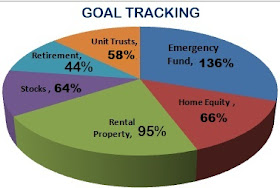The most effortless way to invest in shares is through ETFs in my opinion. This should be a great option for those who lack the time and resources to invest in individual company and industry research. Losing money in the stocks, especially when you do not have a well-informed strategy is quite easy. The stress that goes with speculation can be outsourced to ''experts'' who are well trained to read the markets. A hands-on approach is also not a bad idea for inquisitive minds like mine. It is important to remember that, only a few of us can manage to be jacks of all trades with success. Definitely not me. That is the reason I strive for a diversified portfolio, with some loyalty to property investing. Real estate is my passion and what I have chosen to pursue. I am well pleased with the fact that it remains my main source of income. But that is not the point of this post.
Our low cost tax-free investment exercise will be on a R500 per month amount. To spice the exercise a bit, I am throwing in R3000 extra from the investor's annual bonus. I have such an overactive imagination, I know. Our investment qualifies to be referred to as low cost because ETFs are generally relatively cheap investments.
Remember that you can invest your monthly R500 in one ETF, a combination of two ETFs or even a combination that includes any other two qualifying products. National Treasury mentioned the collective investment schemes, bank savings accounts, fixed deposits, retail savings bonds, REITs, etc, as qualifying products. Let us quickly list our assumptions:
- Similarly to our previous example, I am using 25% annual return. (Again this is attainable).
- Monthly Investment of R500
- Every year, the investor adds a R3,000 into the fund from their annual bonus
- Return per annum 25%
- Term in years 16 (I am using the same number of years from our previous exercise for consistency’s sake. More years at this amount make better investment sense.)
- Tax Rate 0%
- All income like dividends earned is re-invested
- There are no withdrawals throughout the investment period
| Year | Beginning of Year | Interest | End of Year | Contribution |
|---|---|---|---|---|
| Year 1 | R3,500 | R1,720.12 | R10,720.12 | R9,000 |
| Year 2 | R14,220.12 | R4,729.59 | R24,449.71 | R18,000 |
| Year 3 | R27,949.71 | R8,583.92 | R42,033.63 | R27,000 |
| Year 4 | R45,533.63 | R13,520.30 | R64,553.92 | R36,000 |
| Year 5 | R68,053.92 | R19,842.44 | R93,396.36 | R45,000 |
| Year 6 | R96,896.36 | R27,939.41 | R130,335.79 | R54,000 |
| Year 7 | R133,835.79 | R38,309.48 | R177,645.27 | R63,000 |
| Year 8 | R181,145.27 | R51,590.75 | R238,236.02 | R72,000 |
| Year 9 | R241,736.02 | R68,600.49 | R315,836.51 | R81,000 |
| Year 10 | R319,336.51 | R90,385.39 | R415,221.91 | R90,000 |
| Year 11 | R418,721.91 | R118,286.03 | R542,507.92 | R99,000 |
| Year 12 | R546,007.92 | R154,019.21 | R705,527.13 | R108,000 |
| Year 13 | R709,027.13 | R199,783.86 | R914,310.99 | R117,000 |
| Year 14 | R917,810.99 | R258,396.06 | R1,181,707.05 | R126,000 |
| Year 15 | R1,185,207.05 | R333,462.57 | R1,524,169.64 | R135,000 |
| Year 16 | R1,527,669.64 | R429,602.64 | R1,962,772.27 | R144,000 |
- Total Amount Invested is R144,000 ((R500 X 12)+(3000))X16
- End of Term Balance is R1,962,772.27
- Total Interest (income) earned R1,818,772.27
Once again, please do:
- Ensure that your investment product of choice does qualify to be one of the tax free savings accounts. Most exchange traded funds (ETFs) qualify.
- Note that our exercise is on a 16 year term, however one can go on until they reach the allowed maximum contribution of R500,000 in their lifetime (at the moment: August 2015) whilst avoiding to exceed R30,000 (increased to R33,000 in 2017) in any one year.
- Note that withdrawals cannot be re-invested and still count as part of the lifetime limit.
- Report to SARS in the section under income earned in the tax free account and declare your income as non-taxable.
Note:
Thanks for the amazing emails. I keep all emails anonymous when I do respond to them through this platform. Feel free to make a follow up question or comment using the "Contact Us" button above.
If you find this post helpful, be so kind to share it on your Facebook wall or in other social networks using one of the buttons below.

0 comments:
Post a Comment